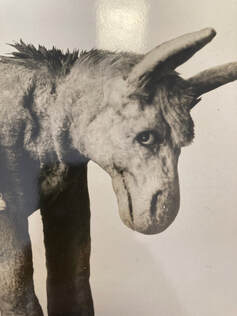|
You may be familiar with accessing books, archive collections, or microfilms at the British Library, but it can be daunting to look for and order play manuscripts if you haven't done so previously.
The staff in the Manuscripts reading room are really helpful, but I thought a users guide for any first-time researchers wanting to look in the Lord Chamberlain's Plays Collection might be useful so that you know what to expect and ask for. So here we go:
0 Comments
In April 2022 I was in the University of Bristol Theatre Collection researching the London cabaret scene of the early to mid twentieth century when I saw this face peeking out at me from an open folder of programmes and cuttings. I was immediately intrigued! The full picture was, I assumed, a publicity shot for a cabaret act, a play, or perhaps even a film.
Another curio from the Lord Chamberlain's Plays Collection - a sketch performed at the Lewisham Hippodrome in April 1913 and set at an unnamed London Underground station, in which the Devil (later revealed to be a medical student in costume as Mephistopheles) and his wife (later revealed to be a nurse in costume as a Folly) are waiting for either a tube train or an airship to take them home. About halfway through the piece the Devil brags to a Policeman that he is inciting militant suffragettes to commit violent crimes. As he is getting arrested a suffragette runs in, puts something into a handily adjacent post box that sets it on fire, shouts "Votes for Women" and runs off, pursued by the Policeman. There's a reference to the Devil's wife being a hunger-striker too. Curious!
Reading Sixteen - 17th December 2020
'Our Own Twelve Anti-Suffragist Reasons', 'Why We Oppose Pockets for Women', and 'Fashion notes: Past and Present' from Are Women People? by Alice Duer Miller (1915) Prologue for a Women's Theatre by Israel Zangwill (1911) Women Do Not Want It by Charlotte Perkins Gilman (1897) 'Cautionary Tales in Verse' from Votes for Women, 6 October 1911 Readers: Maggie Saunders, Sajeela Kershi, John Fleming, Catherine Harvey Green, Annie Walker, Philippa Ritchie, Sarah McCourt, Jamie Newall, Sarah Annakin, Lucy Stevens, Jemma Churchill, Stephanie Fayerman. Reading Seventeen - 26th January 2021 10 Clowning Street by Joan S. Dugdale (1913) Little Jane and Grandmama and Fair Play by Lorimer Royston (1914) Readers: Jemma Churchill, Bronwyn Elizabeth, John Fleming, Luke Meredith, Genevieve Swallow, Catherine Harvey Green, Lucy Stevens, Maggie Saunders, Annie Walker, Jamie Newall, Sarah Annakin, Philippa Ritchie, Sarah McCourt. In September I did a show called 'An Afternoon with Ada Campe' at the Phoenix Arts Club in London. It was the longest bit of live performance I'd done since February, and was packed full with new material including a socially distanced magic trick and some songs - the first time Ada had sung on stage. It was great fun - and a second show called 'A Late Afternoon with Ada Campe' happened at Above the Stag Theatre in Vauxhall in November - simultaneously my first and last live appearance that month due to the implementation of the second lockdown in London.
After both shows I had a sort of post-show 'hangover' that lasted for days - the rush and excitement of performing live again and packing in so much new material at once was wonderful, but whereas in pre-COVID times I was used to finishing Ada shows with a great release of tension, for both of these the tension seemed to stay in my body... presumably because the chance to perform live has been so rare during 2020 that I didn't want to let the feeling or memory of it go. Reading Nine - 15th October 2020 Supposing by Sewell Collins (1913) The First Actress by Christopher St John (1911) Readers: Sarah Annakin, Nick Dutton, Stephanie Fayerman, Maroussia Frank, John Fleming, Catherine Harvey Green, Michelle Kelly, Sajeela Kershi, Sarah McCourt, Charlotte Moore, Jamie Newall, Bobbie O'Callaghan, Philippa Ritchie, Maggie Saunders, Velma Von Bon Bon, Annie Walker, Faye Wilson Reading Six - 8th September 2020 Her Will by Christopher St John (1914) At the Gates by Alice Chapin (1909) Readers: Caroline Cooke, Stephanie Fayerman, Emma Fenney, Sarah Ford, Lucy Frederick, Kathryn Martin, Charlotte Moore, Jamie Newall, Bob Sinfield, Alison Skilbeck, Lucy Stevens, Genevieve Swallow Reading Three - 11th August 2020 Jack and Jill and a Friend by Cicely Hamilton (1911) Votes for Children by Ernest Hutchinson (1913) Readers: Rob Bond, Kudzanayi Chiwawa, John Fleming, Maroussia Frank, Lucy Frederick, Mark Huckett, Charlotte Moore, Jamie Newall, Bob Sinfield, Lucy Stevens, Genevieve Swallow, Velma Von Bon Bon, Annie Walker Reading Two - 4th August 2020 A Woman's Influence by Gertrude Jennings (1909) Might is Right by Netta Syrett (1909) Readers: Rob Bond, Jemma Churchill, Stephanie Fayerman, John Fleming, Charlotte Moore, Maggie Saunders, Lucy Stevens, Genevieve Swallow, Annie Walker, Ben Wendel, Velma Von Bon Bon, Sarah-Louise Young |
NaomiThoughts, reflections, bits of research Archives
April 2023
Categories
All
|

 RSS Feed
RSS Feed